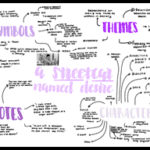What and How to Revise for your Other Drama exam (Edexcel A Level English Literature Component 1B)
Part B of this component (Other Drama) is worth the fewest marks of all of the exam questions for your A Level – 25 marks instead of 35 for Shakespeare, 40 for Prose and 30 for each of the poetry questions. For this reason, and also because (depending on the play you have studied) this play tends to be perceived to be easier than the Shakespeare play, students sometimes spend less time revising for this exam. Whilst it is sensible to spend more time preparing for exams with a higher weighting, don’t dismiss this one too much. If you find this text easier, this may be the exam where you can really shine, and 25 marks could reflect the difference between several grade boundaries.
Many of the tips I suggested in the last article about revising for Shakespeare will apply to this unit (and to the others too) but I will repeat some of the advice so that you have a helpful ‘to do’ list for this unit too.
Before you start, make sure you know exactly what the assessment objectives for this question are. You are assessed for:
- AO1: your ability to write an informed, articulate essay; your use of relevant concepts and terminology.
- AO2: your ability to analyse the ways meanings are shaped in texts.
- AO3: your ability to understand the relevance and significance of relevant context (in particular, the literary context of either Tragedy or Comedy)

Other Drama Revision Tips
- Make sure you have read and reread the play. Even as a teacher, every time I reread a text with a new class or student, I notice something else in it that I hadn’t noticed before. You cannot expect to understand any text well enough to answer an exam question on it if you have only read it once.
- Try to see at least one performance of the play. Plays were written to be performed, and you can’t fully appreciate aspects of stagecraft if you don’t see it performed. Watching a performance will develop your understanding of the whole plot, the characters, the dramatic impact of entrances, exits, music – all of it! It doesn’t have to be at the theatre – films will do too. There are lots of stage productions available online since Covid and your school may well be paying for free access which you can use,
- This is an open book exam, so there is no need to learn quotations by heart. Some students still choose to do this, and it can save them time in the exam if they don’t have to search for particular quotations, but this is not essential. What is far more useful is knowing the text well enough that you can find the evidence you need quickly. To help with this, write brief summaries of each scene on the back of a card, with the scene number on the back and then try to sequence them from memory. This should help you remember the order of events and navigate your way around the play efficiently.
- You could also try the above method by writing the opening and closing lines of each scene on cards. This will help you secure the plot and focus on the dramatic significance of the way scenes are started and finished.
- A lot of the terminology for this unit will overlap with the Shakespeare unit so use the same method I suggested in the last blog: make definition cards and stick them around your house so that you see them frequently. Your family will love learning about stagecraft, allusion, imagery (maybe!) and might be able to help by testing you on these definitions.

- Make mind maps for each theme in the play – using colour paper and pens can make this job more appealing. Add all of the places where this theme is evident in the play, with quotations if you can. Read about that theme, either in the notes/introduction of your book, online or in literary publications. The more you think about that theme, the more you will understand what the writer wanted to achieve and come up with interesting thesis ideas.
- Do lots of essay planning. Whether you write out plans or just think them through as you walk to school, it’s really valuable to consider what you would say in response to different questions. Doing this before you are in the pressurised situation of an exam room allows you to really think about it and form a good thesis. Try to consider what the writer’s intention might have been when they wrote the play and how the theme or aspect in the question contributes to this intention. Think about what evidence you would use and see how quickly you can find that evidence in the book (if you can’t, try tip 3 again!) Think about how the context of the play might have affected this aspect. The more possible questions you have planned for, the more prepared and calm you will feel on exam day.
- Do some revision with someone else who is studying your subject. Don’t do this all the time because you’ll be on your own in the exam and you need to be ready for that, but spending some time with a friend talking about how you would answer certain questions can be a great way to develop your thinking and confidence. Your friend might have a totally different way of approaching a question to you and help you see things more clearly (or you may just feel smug that you understand it better!)
- Set aside a regular time to do timed essays. You will have about 55 minutes to answer this question in the exam. Try to create an exam like environment: leave your phone in another room; tell your family what you are doing; turn off any music. This is a really important part of your exam preparation as you need to get used to writing a whole response in this time so don’t miss this out. Get this marked – hopefully your teacher is willing to do this but, if not, use my proofreading service. Read their feedback carefully – you may have missed out a whole Assessment Objective (I’ve lost count of how many time students just omit AO3!) and you need to be aware that you are doing this before the exam.
- Know the context of your play. You could mind map all of the historical, social, cultural and biographical context that has influenced your play and then try to recreate the mind map from memory. Knowing the literary context is more important than all of the other types of context, so make sure you know the generic conventions of tragedy/comedy, can identify the parts of your play that fit these conventions and know when (and why) a playwright might have flouted these conventions.
As mentioned in the previous article, keep a list of anything you don’t understand and check with your teacher (or email me) if there is something you don’t get or you can be sure that is what will be giving you nightmares before your exam.
Again, check which edition of the text your school will be giving you in the exam and try to ensure you have the same copy to revise from as this will help you locate key sections far more quickly in the exam.

